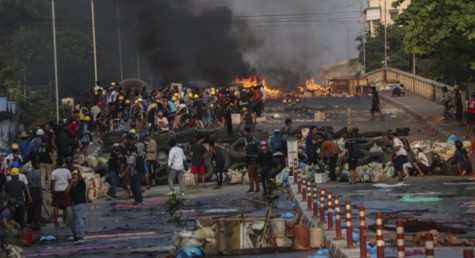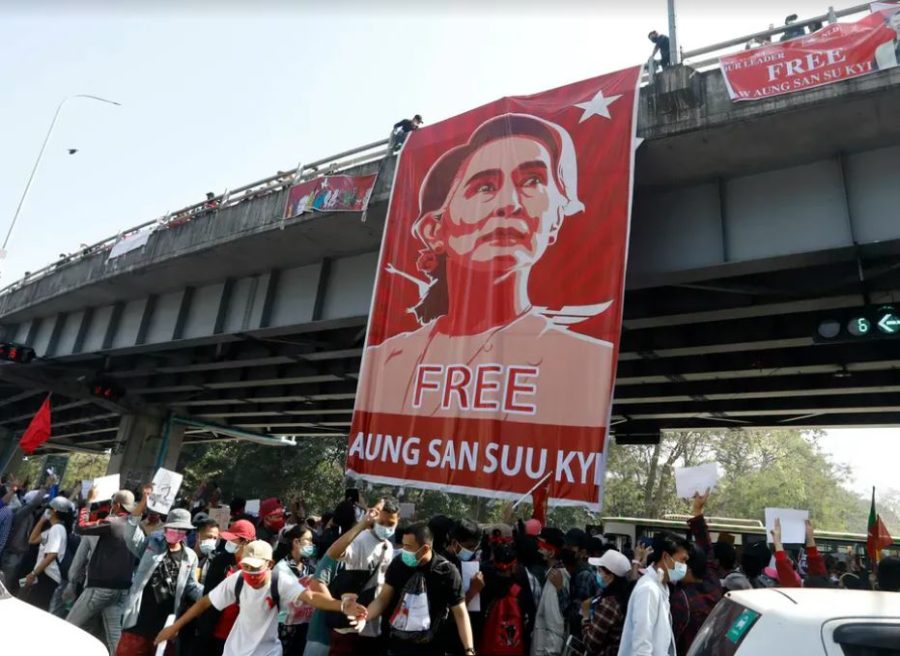Myanmar’s Military Coup Was Decades in the Making
What is happening in Myanmar? Hundreds of thousands of locals are swarming the streets. Peaceful protestors are being gunned down. Access to social media platforms and internet services are being cut across the country. Myanmar’s leader and Nobel Peace Prize winner, Aung San Suu Kyi, has been arrested for having walkie-talkies. While it has shocked leaders worldwide, Myanmar’s most recent military coup was decades in the making.
Myanmar has had a complicated history with democracy, which isn’t the first time the military has seized power. Before it gained independence in the years after World War II, Burma, as it was called back then, spent 124 years under British rule. When it gained independence as the Union of Burma in 1948, there was serious unrest between the many cultural and ethnic groups that made up the country. In 1962, the military staged a coup, throwing out Burma’s constitution and forming a military junta, followed by a one-party state headed by the BSPP. In March of 1988, the BSPP’s power was finally challenged by a nationwide movement started by students. During these protests, Aung San Suu Kyi, the daughter of Aung San, who is widely regarded as the father of the nation and a key player in the push for independence against British rule, emerged as a leading voice. However, by September of 1988, the military crushed the uprisings, and Aung San Suu Kyi was placed under house arrest for 15 years. During that time, she kept pushing for change with her political party, the National League for Democracy (NLD), which eventually earned her a Nobel Peace Prize in 1991.
In 2008, after years of pressure from the international community, the military announced that it would transition to a more democratic system of government. Nonetheless, the 2010 election was characterized by interference and fraud and was boycotted by Aung San Suu Kyi’s NLD. Unsurprisingly, the military was replaced by a pro-military party called the USDP, which remained in power from 2011-2015, during which the military still essentially controlled the country. It wasn’t until 2015 that Myanmar finally held its first free and fair elections, which the NLD won in a sweeping victory. Unfortunately, the constitution blocked Aung San Suu Kyi from becoming president because her kids are citizens of another country. So, she was given the title of State Counselor but was widely recognized as Myanmar’s actual leader. Ultimately, though, the military only agreed to share power because of the 2008 constitution, which guaranteed the military 25% of the seats in the parliament and control over some key areas. Before the coup on February 1st, the military still used the parliament to block reform, and they maintained power over defense, immigration, and the judiciary.

So, why was this military coup years in the making? For years, Aung San Suu Kyi talked about removing the military from the parliament and stripping them of their political power. Since the NLD won the 2020 election by such a large margin, that goal was far more reachable. Additionally, Min Aung Hlaing, the military coup leader, had been vocal about becoming president, which would have been possible if he won 1/3 of the seats in the election. One of the reasons he wanted to become president was to protect himself from some of the crimes he had committed as a military leader. He’s been called “one of the most wanted men on the planet” for his brutality against the Rohingya people, a Muslim minority group living in the Rakhine region of Myanmar. Min Aung Hlaing had killed thousands of Rohingya people and burnt over 200 villages to the ground over his past ten years as a military leader, resulting in hundreds of thousands fleeing across the border to Bangladesh. Without the military holding political power or the leader of the country protecting him, he would receive serious consequences.
So, what’s next? Nobody knows. The United Nations Security Council has done nothing to punish Myanmar’s generals. With violence raging on, both the military and protestors look like they won’t be backing down anytime soon. We will have to see what happens next.

Dan Kerik is a senior planning to pursue a business degree at the University of Georgia next year. While at Wheeler, he is involved in cross-country, National...



